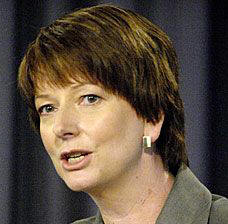|
|
|
|
|
|
|
News & Views item - March 2008 |
![]() Speculation
Mounts on Wide-ranging Review of Higher Education -- Gillard Remains Silent.
(March 12, 2008)
Speculation
Mounts on Wide-ranging Review of Higher Education -- Gillard Remains Silent.
(March 12, 2008)
 Although
Kevin Rudd's Labor government has been in office over 100 days, Julia Gillard,
Deputy Prime Minister, Federal Minister for Education and Minister for
Employment and Workplace Relations has yet to announce an expected review of
higher education.
Although
Kevin Rudd's Labor government has been in office over 100 days, Julia Gillard,
Deputy Prime Minister, Federal Minister for Education and Minister for
Employment and Workplace Relations has yet to announce an expected review of
higher education.
In September 2001 a 360 page report Universities in Crisis: Report on Higher Education was presented to the Australian Senate by the Senate Employment, Workplace Relations, Small Business and Education References Committee.
It was "commended" to the Senate by Labor Senators Jacinta Collins, Trish Crossin and Kim Carr, and Australian Democrat Natasha Stott Despoja.
Senator Stott Despoja filed a fourteen-page report as a supplement to the major findings while Liberal Senators John Tierney and George Brandis withheld endorsement and filed a separate twenty-page opinion.
Now six and a half years later the Rudd Labor government of 100-plus days would be hard pressed to suggest that the crisis has lessened, especially when compared to our OECD cohort.
You might think now it's high-time for the government to put the budget surplus where its "education revolution" talk was.
And it is imperative that Ms Gillard institute the expected review with little further delay and promulgate its implementation and terms of reference.
Obviously the review will not be completed until well after the May budget, indicating that the government will put in the budget "holding measures" pertaining to higher education.
Unfortunately the bickering that has become increasingly public as regards the apportioning of block funding between the Group of Eight and the universities, described by The Australian's Guy Healy as "less focused on research", is both unseemly and detrimental.
The contentiousness stems from perceived, and real, limited federal funding and a formulaic approach for dividing block grants that was designed on "daft" principles.
So we have the vice-chancellor of ANU, Ian Chubb, telling Mr Healy that the research-intensive Group of Eight institutions received less than 60c in research training scheme money for every $1 they win in competitive research income, and the average research training scheme figure for universities was 65c while ANU ended up with a mere 33c.
He went on to say that many Australian universities lacking the research track record of the Go8 secured more than $1 in research training scheme money. The University of the Sunshine Coast, Southern Cross University, Central Queensland University and Edith Cowan University received more than $2.
In professor Chubb's view, barring a significant increase in funding, the Research Training Scheme formula needs to be weighted to better recognise success in attracting research grants.
But Edith Cowan University, Southern Cross University and the University of the Sunshine Coast disagree. As Paul Clark, SCU's vice chancellor put it: "Professor Chubb continues to measure research performance just from national competitive grants. SCU is very strong in co-operative research centres and our research income is significant, hence the high RTS."
Not until on costs are adequately allowed for in research grants will it be possible to address the real concerns regarding block funding.
Finally, for anyone to suggest that today we have 38 universities all teaching the same thing is ludicrous. For example how many of the 38 house classics departments, how many engage in particle physics research.
On the other hand the teaching of, let alone research in, mathematics and statistics in how many of the 38 universities is adequate for supporting courses whose subjects are dependent on their proper understanding and deployment?